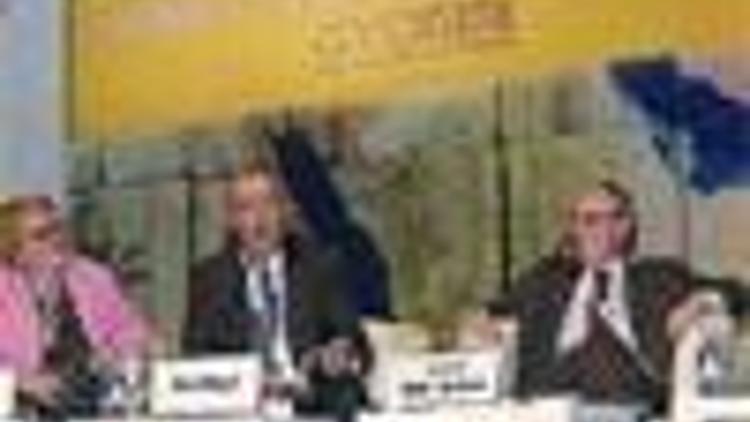Pushing to reform the global economy
Güncelleme Tarihi:

Hurriyet Daily News
Oluşturulma Tarihi: Haziran 03, 2009 00:00
ISTANBUL - Turkey’s once-booming real estate sector suffers amid the crisis, as sector players seek solutions at the Istanbul REstate summit. The Turkish property market has advantages compared to Western countries regarding real estate loans, a participant says.
REstate 2009, an international real estate summit, started Tuesday at the Lütfi Kırdar International Congress Center in Istanbul, focusing on new business opportunities and the effects of the crisis on economies.
Speaking at the summit, Ersin Özince, chairman of the Banks Association of Turkey said Turkey could still develop its real estate sector despite the global crisis, as the Turkish real estate sector has advantages compared to the West’s.
"For example, in Turkey we have no problems regarding real estate loans while the loan problem in the United States caused the global crisis," he said. "We have big potential in Turkey. However, we should try to direct investors to real estate. I observe that some financial activity is moving to other countries. To stop this, we should reform our tax policies."
Erdoğan Bayraktar, chief of the Mass Housing Administration, said Turkey remained "untouched" for foreigners. "We should transfer high technology to benefit from our real estate sector," he said.
Noting that the global crisis would continue to affect the sector, Vefa Tarhan, a professor at Northwestern University, pointed to the structural problems of the economy. "The real sector will always be affected by the crisis, because Turkey has many problems such as lagging tax reforms and unregistered economy," he said.
In Turkey, there are many incentives regarding property loans, but the country should be careful as the scene looks like "the beginning of the U.S. mortgage crisis," Tarhan argued. "Banks should first help the real sector." Tarhan also said the ongoing national campaigns to increase household spending are "boyscoutish."
"Turkey is growing with imports and with a current account deficit," he told the Hürriyet Daily News & Economic Review.
Regarding the relations with the International Monetary Fund, or IMF, Tarhan said he finds it "a mystery" that the government still has not signed a deal.
Marc Uzan, the executive secretary of the "Reinventing of Bretton Woods Committee and EURO50 Group," argued that the world needs a reserve currency other than the U.S. dollar. Noting that China will still see positive growth, he said China will try to make its currency more valuable in countries such as Brazil.
"As we anticipate having another financial system in the aftermath of the crisis, another reserve currency can enter our lives," he said. "After the crisis, there will be huge fiscal deficits for all countries."
Speaking after Uzan, Arnab Das, the managing director of Dresdner Kleinwort, said emerging markets would continue to grow despite the crisis. Das also said the global economy needs new tools to regulate the global monetary system.
Kees Hage, a partner at PriceWaterhouseCoopers, said the world should "focus on short-term solutions" now, but such a perspective can impact the speed of changes in the long term.
Speaking at the summit, Ersin Özince, chairman of the Banks Association of Turkey said Turkey could still develop its real estate sector despite the global crisis, as the Turkish real estate sector has advantages compared to the West’s.
"For example, in Turkey we have no problems regarding real estate loans while the loan problem in the United States caused the global crisis," he said. "We have big potential in Turkey. However, we should try to direct investors to real estate. I observe that some financial activity is moving to other countries. To stop this, we should reform our tax policies."
Erdoğan Bayraktar, chief of the Mass Housing Administration, said Turkey remained "untouched" for foreigners. "We should transfer high technology to benefit from our real estate sector," he said.
Noting that the global crisis would continue to affect the sector, Vefa Tarhan, a professor at Northwestern University, pointed to the structural problems of the economy. "The real sector will always be affected by the crisis, because Turkey has many problems such as lagging tax reforms and unregistered economy," he said.
In Turkey, there are many incentives regarding property loans, but the country should be careful as the scene looks like "the beginning of the U.S. mortgage crisis," Tarhan argued. "Banks should first help the real sector." Tarhan also said the ongoing national campaigns to increase household spending are "boyscoutish."
"Turkey is growing with imports and with a current account deficit," he told the Hürriyet Daily News & Economic Review.
Regarding the relations with the International Monetary Fund, or IMF, Tarhan said he finds it "a mystery" that the government still has not signed a deal.
Marc Uzan, the executive secretary of the "Reinventing of Bretton Woods Committee and EURO50 Group," argued that the world needs a reserve currency other than the U.S. dollar. Noting that China will still see positive growth, he said China will try to make its currency more valuable in countries such as Brazil.
"As we anticipate having another financial system in the aftermath of the crisis, another reserve currency can enter our lives," he said. "After the crisis, there will be huge fiscal deficits for all countries."
Speaking after Uzan, Arnab Das, the managing director of Dresdner Kleinwort, said emerging markets would continue to grow despite the crisis. Das also said the global economy needs new tools to regulate the global monetary system.
Kees Hage, a partner at PriceWaterhouseCoopers, said the world should "focus on short-term solutions" now, but such a perspective can impact the speed of changes in the long term.

